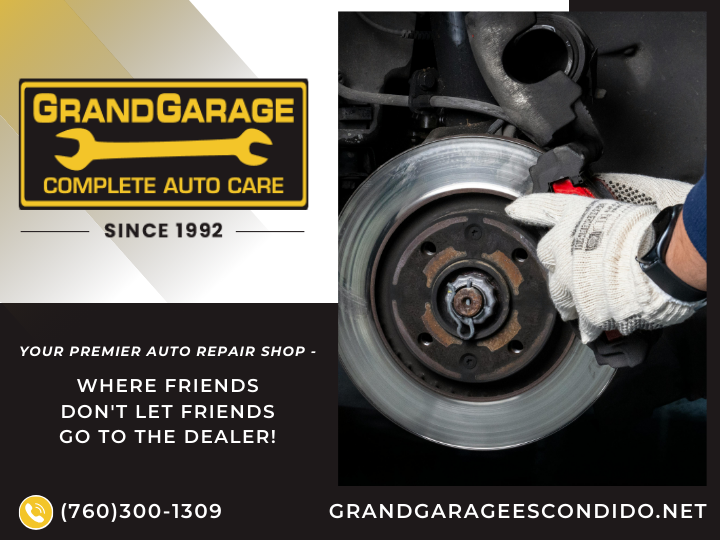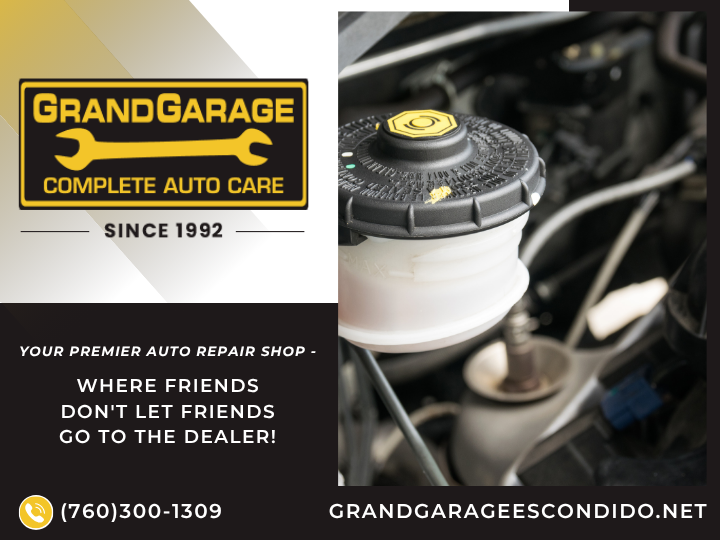Posted on 8/22/2025

How Much Do Brakes Cost on a Car? When most people ask, “How much do brakes cost?” they’re expecting a dollar amount. But the real answer isn’t about money—it’s about safety, confidence, and long-term reliability. At Grand Garage in Escondido, we believe brakes aren’t just another maintenance item on your vehicle—they’re your car’s most important safety system. The true “cost” of brakes is measured not in price tags, but in trust, prevention, and the peace of mind they give you every time you drive. The Real Cost of Brakes Is Safety Brakes are what stand between a normal stop and a dangerous accident. They work every time you drive through Escondido, whether you’re: Rolling down East Grand Avenue, Heading toward I-15 for a commute, Navigating Valley Parkway traffic, or Driving mountain roads out toward Ramona or Julian. The cost of brakes shows up most wh ... read more
Posted on 8/18/2025

Complete Guide to Professional Truck Service in Escondido, CA — Keep Your Truck Road-Ready All Year Why Truck Service Matters in Southern California Your truck isn’t just transportation — it’s your workhorse for job sites, weekend adventures, and everything in between. Whether you drive a light-duty pickup, a heavy-duty diesel, or a commercial fleet vehicle, consistent professional maintenance is what keeps your truck reliable, safe, and performing at its best. Here in San Diego County, trucks face unique challenges — from year-round heat to steep grades and desert dust. Skipping service may not cause immediate breakdowns, but over time it can lead to expensive repairs and premature wear. At Grand Garage, we deliver precision truck service designed for Escondido drivers, protecting your investment and ensuring your truck is ready for anything. Core Truck Services We Recommend 1) Oil & Filter Changes — Protecting Your Engine&r ... read more
Posted on 8/15/2025

What Happens If I Don’t Service My Car on Time? Life gets busy. Work, family, errands — and that “Service Due” light on your dashboard keeps getting ignored. The car is still running fine, so it can wait… right? Here’s the reality: “Still running fine” doesn’t mean your car is healthy — it means wear and damage are quietly building up out of sight. At Grand Garage in Escondido, CA, we’ve seen perfectly good vehicles lose years of life and cost thousands more in repairs — all because essential services were delayed. Why We Don’t Just Follow Factory Schedules Manufacturer maintenance schedules are written for one goal: get the car through the warranty period. That’s the minimum. At Grand Garage, our Maximum Lifespan Maintenance Plan is built to: Prevent small problems from turning into big repairs Replace parts and fluids before they fail Keep your vehicle running r ... read more
Posted on 8/11/2025

Can I Fix My Brakes Myself? Yes — But Should I? Brake Repairs: Just Because You Can Doesn’t Mean You Should With thousands of brake replacement tutorials floating around online, it’s easy to think: “Why not just fix it myself?” And to be fair, you probably could. But here’s what too many people learn the hard way: Fixing your brakes is not the same as ensuring your vehicle is safe. Brakes are your last line of defense on the road—and when they fail, there’s no warning and no second chance. If you’re in Escondido, or nearby areas like San Marcos, Valley Center, Hidden Meadows, or Rancho Bernardo, read this before you grab a wrench and dive into your own brake repair. What DIY Brake Repair Technically Includes If you’re handy, you might be able to: Replace worn brake pads Swap out rotors Bleed the brake lines Install new calipers Flush brake fluid ... read more
Posted on 8/8/2025

What Happens If You Let Your Car Sit Too Long? Escondido and North County Drivers: Time Might Be Wrecking Your Vehicle Right Now We all have times when a vehicle sits parked longer than usual. Maybe you’re working from home, spending the season out of town, or just using your second car less. Whatever the reason, your car might look fine on the outside—but inside, time is causing damage you can’t see. At Grand Garage in Escondido, we help drivers across San Marcos, Vista, Valley Center, and North County recover from hidden problems caused by parked cars. The scary part? Most damage happens silently—before you ever turn the key. Let’s walk through what actually happens to a car when it sits too long, what it could cost you, and how to prevent expensive repairs down the line. 1. Your Battery Will Die—Even If Everything’s Off Modern cars constantly draw power to support: Alarms Keyless entry systems Clock m ... read more
Posted on 8/4/2025

Should I Change My Brake Fluid? The Overlooked Service That Could Save Your Brakes, Your Wallet—and Your Safety Brake fluid is one of those things most drivers never think about—until something goes wrong. At Grand Garage in Escondido, CA, we’ve seen it happen far too often: customers come in with soft brakes, warning lights, or damaged ABS systems, only to find out it could have been prevented with a routine brake fluid flush. This isn’t just maintenance—it’s a matter of safety. Whether you drive every day through Escondido, San Marcos, Valley Center, Vista, or Rancho Bernardo, your brake system depends on healthy brake fluid. So let’s break down why it matters, what happens when it goes bad, and how to protect your vehicle with expert service. What Is Brake Fluid—and Why Is It So Important? Brake fluid is a special type of hydraulic fluid that transfers pressure from your brake pedal to the actual braking components ... read more
Posted on 8/1/2025

Why Is My Truck Misfiring? Understanding the Real Problem Behind the Shake, Power Loss, and Flashing Check Engine Light A truck that misfires is more than just frustrating—it’s vulnerable. That hesitation when you hit the gas, the rough idle at a red light, or the flashing check engine light under acceleration… those are not random glitches. They're warning signs that something is breaking down inside your engine. If your truck is misfiring, it's not just wasting fuel—it's damaging itself with every mile. At Grand Garage in Escondido, CA, we help truck owners identify and fix misfires before they become expensive repairs. Whether it’s a small ignition issue or a deeper mechanical failure, we get to the root cause fast—and fix it right the first time. What Is a Misfire? Every cylinder in your engine must receive the right mixture of air and fuel, compressed to the right level, and ignited at exactly the right moment ... read more
Posted on 7/28/2025

Dashboard Warning Lights: What They Mean, Why They Matter, and When to Act Your car is trying to tell you something. Those glowing icons on your dashboard aren't suggestions—they're urgent alerts, designed to protect your engine, brakes, tires, and even your safety. Ignore them, and you risk turning a minor repair into a full-blown breakdown. The problem? Most drivers don’t know what the lights actually mean—or how serious they are. This guide gives you clarity, confidence, and control. How to Interpret Dashboard Lights Your car speaks in color-coded urgency: 🔴 Red Lights = Stop Now: Critical safety or mechanical issue. 🟠 Yellow/Orange Lights = Warning: Something isn’t right and needs attention soon. 🔵 Blue/Green Lights = Info: A system is active (e.g., headlights or cruise control). Let’s decode the 10 most important lights that show up when something’s wrong—and what you should do when ... read more
Posted on 7/25/2025

How Much Does an Alignment Cost? Why the Real Value of Alignment in Escondido Is More Than a Number If your car is drifting left or right, your steering wheel feels off-center, or your tires are wearing out faster than expected, chances are your alignment is off. Naturally, most drivers want to know, “How much does an alignment cost?” At Grand Garage in Escondido, CA, we’ve heard that question many times—and we understand the concern. But the truth is, the real value of an alignment goes far beyond just a number. It’s not just about cost—it’s about preserving the performance, safety, and lifespan of your vehicle. Let’s dive into what really determines the cost of an alignment, what’s included in a quality alignment service, and why trusting experienced professionals makes all the difference. What Is a Wheel Alignment? A wheel alignment is a precise service that adjusts your vehicle’s suspension system so t ... read more
Posted on 7/21/2025

Why Is My Truck Shaking While Driving? | Grand Garage in Escondido, CA Explains What’s Really Going On When your truck starts to shake while driving, it’s more than just an annoyance—it’s a warning. Whether the vibration is in your steering wheel, seat, or felt through the floor, your vehicle is telling you something is off. And in many cases, ignoring it will only lead to bigger problems and more expensive repairs. At Grand Garage, we help Escondido drivers get to the bottom of truck shaking issues with precision diagnostics, proven repairs, and customer-first service. Here’s what every truck owner should know about that telltale shake—and how to fix it before it gets worse. 1. Unbalanced or Damaged Tires – The #1 Cause of Highway Shaking If your truck starts shaking at 45–70 MPH, the most common issue is tire imbalance or tire damage. Symptoms: Steering wheel wobble at higher speeds. Vibration felt in the f ... read more